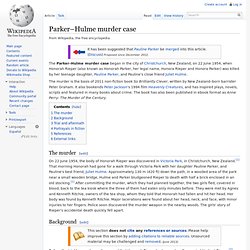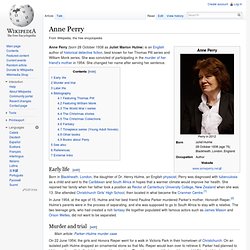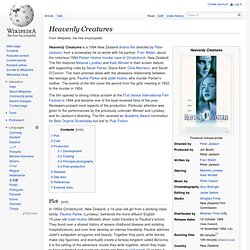

Mais ne nous délivrez pas du mal (1971) - Plot Summary. Parker–Hulme murder. The Parker–Hulme murder case began in the city of Christchurch, New Zealand, on 22 June 1954, when Honorah Rieper (also known as Honorah Parker, her legal name, Honora Rieper and Honora Parker) was killed by her teenage daughter, Pauline Parker, and Pauline's close friend Juliet Hulme.

The murder is the basis of 2011 non-fiction book So Brilliantly Clever, written by New Zealand–born barrister Peter Graham. It also bookends Peter Jackson's 1994 film Heavenly Creatures, and has inspired plays, novels, scripts and featured in many books about crime. The book has also been published in ebook format as Anne Perry: The Murder of the Century. The murder[edit] On 22 June 1954, the body of Honorah Rieper was discovered in Victoria Park, in Christchurch, New Zealand.[1] That morning Honorah had gone for a walk through Victoria Park with her daughter Pauline Parker, and Pauline's best friend, Juliet Hulme.
Anne Perry. Anne Perry (born 28 October 1938 as Juliet Marion Hulme) is an English author of historical detective fiction, best known for her Thomas Pitt series and William Monk series.

She was convicted of participating in the murder of her friend's mother in 1954. She changed her name after serving her sentence. Early life[edit] Murder and trial[edit] On 22 June 1954, the girls and Honora Rieper went for a walk in Victoria Park in their hometown of Christchurch. Parker and Hulme stood trial in Christchurch in 1954 and were found guilty on August 29 of that year. Parker and Hulme are not believed to have had any contact since their trial.[4] These events formed the basis for the 1994 film Heavenly Creatures, in which Melanie Lynskey portrayed a teenage Pauline Parker and Kate Winslet portrayed teenaged Juliet Hulme. Although many presumed Hulme's and Parker's relationship to be sexual, Perry stated in 2006 that, although the relationship was obsessive, the two were not lesbians.[4]
Pauline Parker. Pauline Yvonne Parker (born 26 May 1938) is a woman from Christchurch, New Zealand, who, together with her friend Juliet Hulme (now known as acclaimed fiction author Anne Perry), murdered her mother, Honorah Rieper, on 22 June 1954. It is believed that the two girls killed Honorah because Hulme and her father were leaving shortly for South Africa and, though Parker wanted to accompany them, her mother forbade it.
According to their own accounts, Parker and Hulme were devoted friends who collaborated on a series of adventure novels which they hoped would be bought by a Hollywood studio and made into epic films. The girls' friendship was documented in detail by Parker in a series of diaries during her teenage years. Relationship with Juliet Hulme[edit] Shortly prior to this, Hulme had discovered her mother was having an affair and her parents were separating. The murder[edit] The girls began to plan the murder of Parker's mother in June 1954. Heavenly Creatures. Heavenly Creatures is a 1994 New Zealand drama film directed by Peter Jackson, from a screenplay he co-wrote with his partner, Fran Walsh, about the notorious 1954 Parker–Hulme murder case in Christchurch, New Zealand.

The film features Melanie Lynskey and Kate Winslet in their screen debuts with supporting roles by Sarah Peirse, Diana Kent, Clive Merrison, and Sarah O'Connor. The main premise deals with the obsessive relationship between two teenage girls, Pauline Parker and Juliet Hulme, who murder Parker's mother. The events of the film cover the period from the girls' meeting in 1952 to the murder in 1954. Plot[edit] In 1950s Christchurch, New Zealand, a 14-year-old girl from a working-class family, Pauline Parker (Lynskey), befriends the more affluent English 15-year-old Juliet Hulme (Winslet) when Juliet transfers to Pauline's school.
During a day trip to Port Levy, Juliet's parents announce that they are going away and plan to leave Juliet behind. Cast[edit] Production[edit] B.